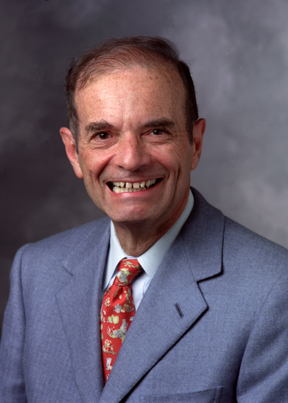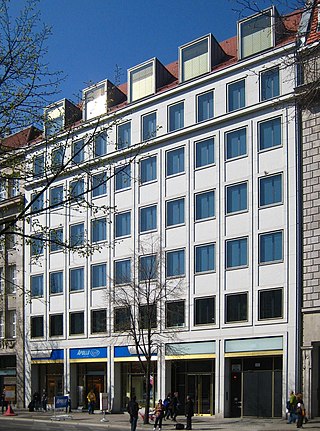Related Research Articles

Lubert Stryer is the Emeritus Mrs. George A. Winzer Professor of Cell Biology, at Stanford University School of Medicine. His research over more than four decades has been centered on the interplay of light and life. In 2007 he received the National Medal of Science from President Bush at a ceremony at the White House for elucidating the biochemical basis of signal amplification in vision, pioneering the development of high density microarrays for genetic analysis, and authoring the standard undergraduate biochemistry textbook, Biochemistry. It is now in its ninth edition and also edited by Jeremy Berg, John L. Tymoczko and Gregory J. Gatto, Jr.

Matthias Mann is a scientist in the area of mass spectrometry and proteomics.

Carolyn Ruth Bertozzi is an American chemist and Nobel laureate, known for her wide-ranging work spanning both chemistry and biology. She coined the term "bioorthogonal chemistry" for chemical reactions compatible with living systems. Her recent efforts include synthesis of chemical tools to study cell surface sugars called glycans and how they affect diseases such as cancer, inflammation, and viral infections like COVID-19. At Stanford University, she holds the Anne T. and Robert M. Bass Professorship in the School of Humanities and Sciences. Bertozzi is also an Investigator at the Howard Hughes Medical Institute (HHMI) and is the former director of the Molecular Foundry, a nanoscience research center at Lawrence Berkeley National Laboratory.

John Kuriyan is the dean of basic sciences and a professor of biochemistry at Vanderbilt University School of Medicine. He was formerly the Chancellor's Professor at the University of California, Berkeley in the departments of molecular and cell biology (MCB) and chemistry, a faculty scientist in Berkeley Lab's physical biosciences division, and a Howard Hughes Medical Institute investigator. He is a member of the National Academy of Sciences and he has also been on the Life Sciences jury for the Infosys Prize in 2009, 2019 and 2020.

Otto Knut Olof Folin was a Swedish-born American chemist who is best known for his groundbreaking work at Harvard University on practical micromethods for the determination of the constituents of protein-free blood filtrates and the discovery of creatine phosphate in muscles.

The American Society for Biochemistry and Molecular Biology (ASBMB) is a learned society that was founded on December 26, 1906, at a meeting organized by John Jacob Abel. The roots of the society were in the American Physiological Society, which had been formed some 20 years earlier. ASBMB is the US member of the International Union of Biochemistry and Molecular Biology.

JoAnne Stubbe is an American chemist best known for her work on ribonucleotide reductases, for which she was awarded the National Medal of Science in 2009. In 2017, she retired as a Professor of Chemistry and Biology at the Massachusetts Institute of Technology.
The European Biological Inorganic Chemistry Conference, or EUROBIC, is a biannual conference on Bioinorganic chemistry founded in 1992 that showcases the best work in bioinorganic chemistry. The conference is held in Europe but attracts scientists from all over the world. EUROBIC was the result of a merger of the Swiss-Italian SIMBIC conference and the French-German SAMBAS conference. The aim is to create a forum and promote collaboration between scientists in the highly multidisciplinary field of Biological Inorganic Chemistry, ranging from biology to inorganic chemistry.

Judith P. Klinman is an American chemist, biochemist, and molecular biologist known for her work on enzyme catalysis. She became the first female professor in the physical sciences at the University of California, Berkeley in 1978, where she is now Professor of the Graduate School and Chancellor's Professor. In 2012, she was awarded the National Medal of Science by President Barack Obama. She is a member of the National Academy of Sciences, American Academy of Arts and Sciences, American Association for the Advancement of Science, and the American Philosophical Society.

The Ernst Schering Prize is awarded annually by the Ernst Schering Foundation for especially outstanding basic research in the fields of medicine, biology or chemistry anywhere in the world. Established in 1991 by the Ernst Schering Research Foundation, and named after the German apothecary and industrialist, Ernst Christian Friedrich Schering, who founded the Schering Corporation, the prize is now worth €50,000.

Nigel Shaun Scrutton is a British biochemist and biotechnology innovator known for his work on enzyme catalysis, biophysics and synthetic biology. He is Director of the UK Future Biomanufacturing Research Hub, Director of the Fine and Speciality Chemicals Synthetic Biology Research Centre (SYNBIOCHEM), and Co-founder, Director and Chief Scientific Officer of the 'fuels-from-biology' company C3 Biotechnologies Ltd. He is Professor of Enzymology and Biophysical Chemistry in the Department of Chemistry at the University of Manchester. He is former Director of the Manchester Institute of Biotechnology (MIB).

The Ernst Schering Foundation is a charitable non-profit foundation with headquarters in Berlin, Germany. It was established by Schering AG in 2002. It is legally and financially independent and supports science and arts.
Lila Mary Gierasch is an American biochemist and biophysicist. At present, she is a distinguished Professor working on "protein folding in the cell" in the Department of Biochemistry and Molecular Biology at the College of Natural Sciences, University of Massachusetts—Amherst.
Ute Deichmann is an historian of modern life sciences. She is adjunct full professor at Ben-Gurion University of the Negev in Israel, where she was the founding director of the Jacques Loeb Centre for the History and Philosophy of the Life Sciences in 2007 and continues to be the director. She has also been an associate professor at the University of Cologne, Germany since 2011.
Angela Casini is a medicinal and inorganic chemist who works on metal-based compounds as therapeutic agents. She was awarded the 2012 European Medal for Bio-Inorganic Chemistry and made the 2019 American Chemical Society Inorganic Lecturer.
Martin Ivar Högbom is a Swedish biochemist and structural biologist. He was appointed professor of structural biochemistry at Stockholm University in 2013 and worked as visiting professor at Stanford University during 2016 and 2018.
Wolfgang P. Baumeister is a German molecular biologist and biophysicist. His research has been pivotal in the development of Cryoelectron tomography.
Minkui Luo is a biochemist and professor of biochemistry at Memorial Sloan Kettering Cancer Center. His research interests include chemical biology and the study of posttranslational modifications in epigenetic signaling, with an emphasis on protein methyltransferases.
References
- ↑ "colworth medal", New Scientist: 642–3, June 1971
- ↑ Goodwin, Trevor Walworth (1987), History of the Biochemical Society, 1911-1986, Biochemical Society, pp. 50, 66–67
- ↑ MAX TAKES HOME SILVER IN 2020 EDISON AWARDS, GoPro, 1 April 2020, retrieved 2020-04-11
- ↑ "Recipients of Awards from the Division of Biological Chemistry". Division of Biological Chemistry, American Chemical Society. 2012. Retrieved October 31, 2012.
- ↑ EuroBIC MEDAL, EuroBICs, retrieved 2020-02-16
- 1 2 FEBS Medals, FEBS, retrieved 2020-01-15
- ↑ The Louisa Gross Horwitz Prize, Columbia University, retrieved 2020-02-16
- ↑ "Macfarlane Burnet Medal and Lecture". Australian Academy of Science. Retrieved 22 February 2017.
- ↑ "Mildred Cohn Award in Biological Chemistry". American Society for Biochemistry and Molecular Biology. Archived from the original on 31 May 2016. Retrieved 1 May 2016.
- ↑ (U.S.), National Cancer Institute (1977), Journal, p. 543
- ↑ "Otto-Warburg-Medal". GBM. Archived from the original on 4 November 2016. Retrieved 12 January 2014.
- ↑ "History of the Division of Biological Chemistry". Division of Biological Chemistry, American Chemical Society. 2012. Retrieved October 31, 2012.
- ↑ "Recipients of Awards from the Division of Biological Chemistry". Division of Biological Chemistry, American Chemical Society. 2012. Retrieved September 17, 2019.
- ↑ "The Portland Press Excellence in Science Award". Biochemical Society. Retrieved 2 May 2020.
- ↑ Prix Michel-Sarrazin Archived 2011-07-06 at the Wayback Machine (in French)
- ↑ "Récipiendaires – Prix Wilder-Penfield". Government of Quebec. Retrieved 3 December 2016.
- ↑ "Recipients of Awards from the Division of Biological Chemistry". Division of Biological Chemistry, American Chemical Society. 2012. Retrieved November 1, 2012.
- ↑ "Ernst Schering Prize". Ernst Schering Foundation. Archived from the original on 18 January 2015. Retrieved 16 January 2015.